SPX Has a Cautionary Pattern
Stock-Markets / Financial Markets 2010 May 01, 2010 - 04:38 AM GMT Consumer Spending “Lifts” the Economy - The U.S. economy expanded at a 3.2 percent annual rate in the first quarter as households spent more freely, setting the stage for gains in employment that may help the recovery broaden and accelerate.
Consumer Spending “Lifts” the Economy - The U.S. economy expanded at a 3.2 percent annual rate in the first quarter as households spent more freely, setting the stage for gains in employment that may help the recovery broaden and accelerate.
The increase in gross domestic product was in line with the median estimate of economists surveyed by Bloomberg News and capped the biggest six-month gain since 2003, figures from the Commerce Department showed today in Washington. Consumer spending rose by the most in three years.
Wages and credit are not expanding so where is the money coming from? Could it be strategic defaults on home mortgages?
U.S. Michigan Consumer Sentiment Index Fell in April.
Confidence among U.S. consumers declined in April from the previous month, according to a Reuters/University of Michigan report.
The final index of consumer sentiment dropped to 72.2, higher than forecast, from a reading of 73.6 in March. The gauge was projected to fall to 71 from a month earlier, according to the median forecast in a Bloomberg News survey of 66 economists.
How big will 'May Day' protests against immigration law get?
Thousands are expected to march in cities across the Unites States on Saturday, condemning Arizona's controversial new immigration law and pushing for immigration reform.
The "May Day" protests could take place in as many as 70 cities, according to some organizations.
The SPX has a cautionary pattern.
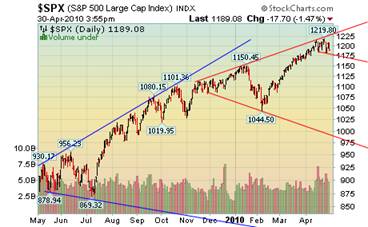 --(FT.com) “…surveys show that the usual investors in major rallies – pension funds, hedge funds and retail investors – have not been net buyers of equities. And he says the most likely explanation for this anomaly in the biggest stock market rally since the 1930s is that major investment banks are the anxious buyers. Their buying would appear to be for one of two reasons. Firstly because they think the authorities will prevail in their (so far unsuccessful) efforts to inflate their way out of debt liquidation; or secondly because they are too big to fail and so can afford to take a huge gamble that enough buying will convince others to rush in and buy their inventory of risk assets at even higher prices.” Is their strategy about to fail?
--(FT.com) “…surveys show that the usual investors in major rallies – pension funds, hedge funds and retail investors – have not been net buyers of equities. And he says the most likely explanation for this anomaly in the biggest stock market rally since the 1930s is that major investment banks are the anxious buyers. Their buying would appear to be for one of two reasons. Firstly because they think the authorities will prevail in their (so far unsuccessful) efforts to inflate their way out of debt liquidation; or secondly because they are too big to fail and so can afford to take a huge gamble that enough buying will convince others to rush in and buy their inventory of risk assets at even higher prices.” Is their strategy about to fail?
Treasuries gain, but lower highs.
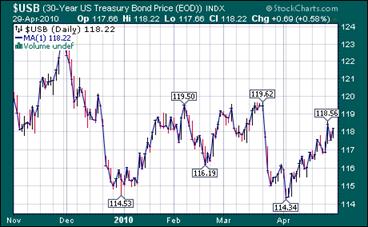 --Treasury 10-year notes headed for their first monthly gain since January as Greece’s fiscal crisis renewed demand for the safest government securities even as the U.S. economic recovery showed signs of accelerating. Yields fell today as investors sought to guard against a breakdown in talks between Greece and the European Union and the International Monetary Fund on 24 billion euros ($32 billion) in budget cuts.
--Treasury 10-year notes headed for their first monthly gain since January as Greece’s fiscal crisis renewed demand for the safest government securities even as the U.S. economic recovery showed signs of accelerating. Yields fell today as investors sought to guard against a breakdown in talks between Greece and the European Union and the International Monetary Fund on 24 billion euros ($32 billion) in budget cuts.
Is gold nearing the end of its rally?
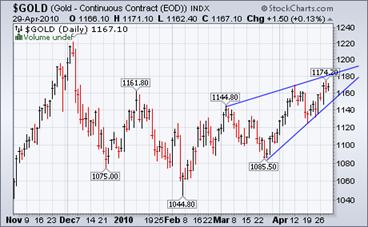 -- Gold climbed to the highest price since December as potential losses in credit markets spurred demand for the precious metal as an alternative to holding currencies.Assets in the SPDR Gold Trust, the biggest investment fund that buys bullion, jumped the most in a year this week through yesterday. The euro rose as much as 0.8 percent against the dollar as European policy makers neared an agreement to rescue Greece.
-- Gold climbed to the highest price since December as potential losses in credit markets spurred demand for the precious metal as an alternative to holding currencies.Assets in the SPDR Gold Trust, the biggest investment fund that buys bullion, jumped the most in a year this week through yesterday. The euro rose as much as 0.8 percent against the dollar as European policy makers neared an agreement to rescue Greece.
Nikkei bounce after a steep decline.
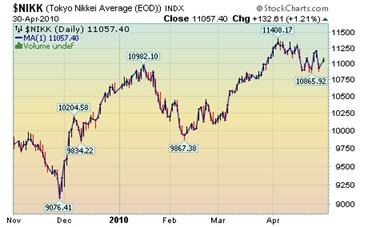 -- Japanese stocks rose, rebounding from their biggest slump in 12 weeks, as earnings boosted speculation the world’s economy will sustain its recovery. “The global economy is picking up and corporate earnings are improving,” said Kiyoshi Ishigane, a strategist in Tokyo at Mitsubishi UFJ Asset Management Co., which oversees about $64 billion. “Investors aren’t very, very bullish but cautiously believe the market will remain resilient.”
-- Japanese stocks rose, rebounding from their biggest slump in 12 weeks, as earnings boosted speculation the world’s economy will sustain its recovery. “The global economy is picking up and corporate earnings are improving,” said Kiyoshi Ishigane, a strategist in Tokyo at Mitsubishi UFJ Asset Management Co., which oversees about $64 billion. “Investors aren’t very, very bullish but cautiously believe the market will remain resilient.”
China curbing property speculators.
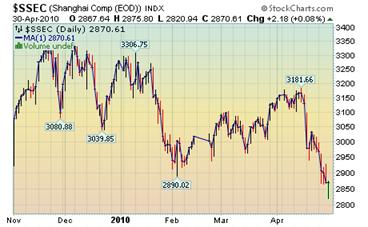 -- China stocks fell, with the benchmark index capping the biggest monthly loss since January, on concern government measures to curb property speculation will slow economic growth and hurt domestic consumption. About three stocks fell for each one that rose on the Shanghai Composite Index, which gained 2.18, or 0.1 percent, to 2,870.61 at the close. China’s markets will be shut on May 3 for a holiday.
-- China stocks fell, with the benchmark index capping the biggest monthly loss since January, on concern government measures to curb property speculation will slow economic growth and hurt domestic consumption. About three stocks fell for each one that rose on the Shanghai Composite Index, which gained 2.18, or 0.1 percent, to 2,870.61 at the close. China’s markets will be shut on May 3 for a holiday.
The U.S. Dollar continues its rally.
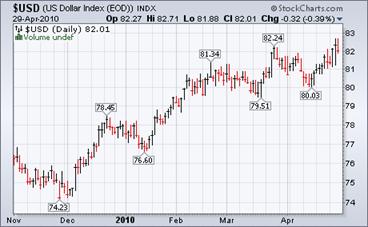 -- The dollar extended its gains, ending higher for the week. The Euro and the Yen continue to fall, revealing economic weakness in Japan and concern over the deteriorating condition of the European Union and the weakening of the economic ties between the countries in Europe. There is currently more concern over Germany dropping its ties with the European Union than with the Greek bond implosion. U.S. taxpayers temporarily rescued Greece through the IMF, but unless the IMF gets another liquidity injection, there is little left for future crises.
-- The dollar extended its gains, ending higher for the week. The Euro and the Yen continue to fall, revealing economic weakness in Japan and concern over the deteriorating condition of the European Union and the weakening of the economic ties between the countries in Europe. There is currently more concern over Germany dropping its ties with the European Union than with the Greek bond implosion. U.S. taxpayers temporarily rescued Greece through the IMF, but unless the IMF gets another liquidity injection, there is little left for future crises.
The average U.S. Household Lost $100,000 in the Financial Crisis.
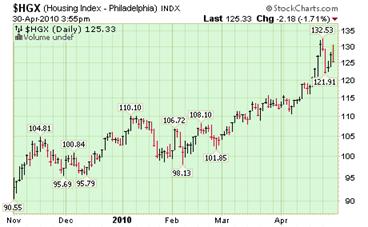 The financial crisis and recession cost U.S. households an average of about $100,000 in lost wealth and income, according to a study by former Treasury Department economist Phillip Swagel.From June 2008 through March 2009, households’ stock holdings fell $66,000 and real estate dropped $30,000, according to the study released today by the Pew Economic Policy Group. Each household also lost an average $5,800 from unemployment and lower earnings from September 2008 through December 2009, the study said.
The financial crisis and recession cost U.S. households an average of about $100,000 in lost wealth and income, according to a study by former Treasury Department economist Phillip Swagel.From June 2008 through March 2009, households’ stock holdings fell $66,000 and real estate dropped $30,000, according to the study released today by the Pew Economic Policy Group. Each household also lost an average $5,800 from unemployment and lower earnings from September 2008 through December 2009, the study said.
Gasoline prices lower by…ahem…one cent.
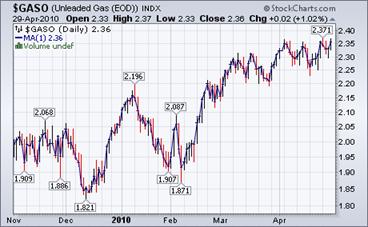 The Energy Information Agency weekly report observes, “At the national level, the price for regular gasoline dipped a penny to $2.85 per gallon but was $0.80 above last year. The East Coast average inched up a cent to $2.83 per gallon, while the Gulf Coast price fell two cents to $2.73 per gallon. The average in the Midwest dropped the most of any major region, falling nearly four cents to $2.81 per gallon.”
The Energy Information Agency weekly report observes, “At the national level, the price for regular gasoline dipped a penny to $2.85 per gallon but was $0.80 above last year. The East Coast average inched up a cent to $2.83 per gallon, while the Gulf Coast price fell two cents to $2.73 per gallon. The average in the Midwest dropped the most of any major region, falling nearly four cents to $2.81 per gallon.”
Natural Gas prices follow lower consumption.
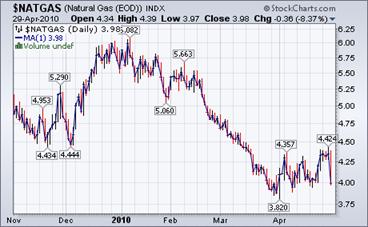 --Natural gas futures fell in New York on speculation that inventories of the industrial fuel will be ample to meet U.S. demand this year.
--Natural gas futures fell in New York on speculation that inventories of the industrial fuel will be ample to meet U.S. demand this year.
Supplies gained 83 billion cubic feet in the week ended April 23 to 1.912 trillion cubic feet, the Energy Department reported yesterday. Inventories were 18.8 percent above the five-year average, up from 18.5 percent a week earlier.
The heads of all of the major banks should be fired.
The leaders of our industry have poured gasoline on the banking crisis and accelerated it completely out of control. It has gotten to the point where legislators and regulators seem to be doing their best to burn the industry down to the ground to rid it of the evils that caused the crisis in the first place.
I put this squarely at the feet of our industry's leaders. They ignored common sense, signs, hints, nudges and flat out requests to curb their risk taking to the point where governments now are proposing rules that not only will force institutional break-ups and hurt our industry, but that very well may cripple the capital formulation engine Main Street needs to generate jobs. Talk about cutting off our proverbial nose to spite our face.
Willem Buiter Issues His Most Dire Prediction Yet.
For the US, with a structural primary deficit in 2009 of 7.3 percent of GDP, the arithmetic of solvency indicates the need for at least 7.3 percent of GDP worth of permanent fiscal tightening (not counting the long-term fiscal tightening required to accommodate future age-related public spending ambitions). For the UK, with a structural primary deficit in 2009 of 6.8 percent of GDP, the required permanent fiscal tightening (beyond what is achieved automatically by a cyclical recovery) would be at least 6.8 percent of GDP. In neither country are policy makers debating how to achieve anything like these degrees of fiscal tightening. In the US, beyond the expiration of part of the Bush tax cuts, no additional fiscal tightening has been planned. With the policy makers in denial, the fiscal situation is likely to deteriorate further, with the result that the magnitude of the permanent fiscal tightening that is required, when the markets eventually demand an immediate fiscal adjustment, will keep on rising.
Traders alert: The Practical Investor is currently offering the daily Inner Circle Newsletter to new subscribers. Contact us at tpi@thepracticalinvestor.com for a free sample newsletter and subscription information.
Our Investment Advisor Registration is on the Web
We are in the process of updating our website at www.thepracticalinvestor.com to have more information on our services. Log on and click on Advisor Registration to get more details.
If you are a client or wish to become one, please make an appointment to discuss our investment strategies by calling Connie or Tony at (517) 699-1554, ext 10 or 11. Or e-mail us at tpi@thepracticalinvestor.com .
Anthony M. Cherniawski,
President and CIO
http://www.thepracticalinvestor.com
As a State Registered Investment Advisor, The Practical Investor (TPI) manages private client investment portfolios using a proprietary investment strategy created by Chief Investment Officer Tony Cherniawski. Throughout 2000-01, when many investors felt the pain of double digit market losses, TPI successfully navigated the choppy investment waters, creating a profit for our private investment clients. With a focus on preserving assets and capitalizing on opportunities, TPI clients benefited greatly from the TPI strategies, allowing them to stay on track with their life goals
Disclaimer: The content in this article is written for educational and informational purposes only. There is no offer or recommendation to buy or sell any security and no information contained here should be interpreted or construed as investment advice. Do you own due diligence as the information in this article is the opinion of Anthony M. Cherniawski and subject to change without notice.
Anthony M. Cherniawski Archive |
© 2005-2022 http://www.MarketOracle.co.uk - The Market Oracle is a FREE Daily Financial Markets Analysis & Forecasting online publication.



